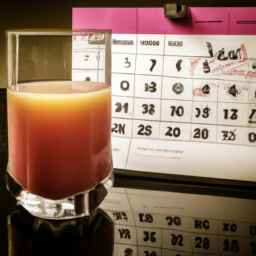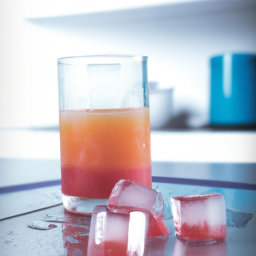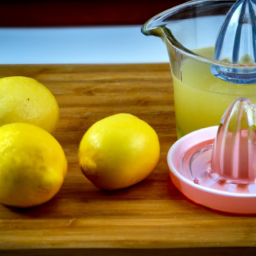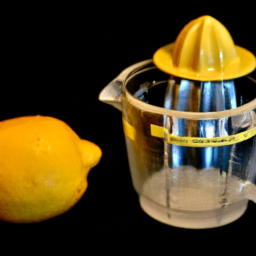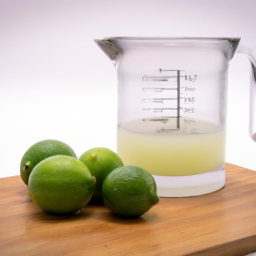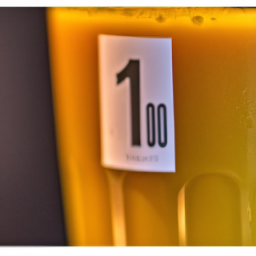As someone who loves fresh juice, I appreciate the importance of getting the most out of my juicer. There’s nothing quite like enjoying a glass of freshly made juice, but the question remains: how long does it actually stay fresh? In this article, I will explore the shelf life of juice from a juicer and the factors that impact its freshness. Whether you’re a seasoned juicer or just getting started, understanding how long your juice will stay fresh and the best methods for preserving it to prolong its shelf life is essential. So, let’s dive in and find out exactly how long we can savor our beloved juice from the juicer.
When it comes to juicer juice, the fresher, the better. But how long can we really expect our juice to stay fresh?
There are a few factors that come into play when determining the shelf life of juicer juice, including the type of fruit or vegetable used, the juicing method, and how the juice is stored. In this article, we’ll be exploring all of these factors and providing tips for maximizing the shelf life of your juice.
So, whether you’re juicing for health benefits or simply love the taste of fresh juice, read on to learn everything you need to know about how long your juicer juice can last.
Key Takeaways
- Freshly squeezed juice is best consumed immediately after juicing, and storing in an airtight container in the fridge can keep juice fresh for up to 24 hours.
- Factors affecting shelf life include type of fruit/veggie, juicing method, and storage conditions. Temperature control is crucial, and glass containers are best for storing.
- Adding lemon juice/citric acid can prevent oxidation and bacteria growth, and vacuum-sealed containers or juicers with built-in vacuum pumps can extend shelf life.
- Expiration dates are suggestions of when juice is freshest, not guarantees of safety. Signs of spoiled juice include changes in color, odor, texture, and presence of mold. Proper handling can prevent growth of harmful bacteria, and discarding expired juice is important to avoid food poisoning and health issues.
The Importance of Fresh Juicer Juice
Juicer juice is at its best when it’s freshly squeezed, bursting with flavor and nutrients. This is because the juice preservation process begins as soon as the fruit or vegetable is juiced. The longer the juice sits, the more it oxidizes and loses its nutritional value.
This means that if you’re looking to get the most out of your juicer, you need to drink your juice as soon as possible after it’s made. However, if you can’t drink your juice right away, there are a few things you can do to make it last longer.
One option is to store your juice in an airtight container in the refrigerator. This can help slow down the oxidation process and keep your juice fresh for up to 24 hours. Another option is to freeze your juice in ice cube trays and then transfer the cubes to a freezer bag. This can help preserve the juice’s nutritional value for up to three months.
Factors affecting the shelf life of juicer juice include the type of fruit or vegetable used, the juicing method, and the storage conditions.
Factors Affecting the Shelf Life of Juicer Juice
The shelf life of freshly squeezed juice can be influenced by various factors, such as temperature and exposure to light. Studies have shown that a decrease in temperature can extend its freshness by up to five days. Here are some factors affecting the preservation of juicer juice:
-
Storage conditions:
-
Refrigeration: Keeping juicer juice in the fridge can extend its shelf life by up to five days. The optimal temperature for preservation is between 32 and 40 degrees Fahrenheit.
-
Freezing: Freezing is not recommended as it can change the taste and texture of the juice. If you must freeze it, do so immediately after juicing and consume it within two weeks.
Another factor that affects juicer juice preservation is the type of juicer used. Centrifugal juicers produce juice with more foam and air, which can cause it to oxidize faster. On the other hand, masticating juicers produce juice with less air, resulting in slower oxidation and longer shelf life.
Understanding these factors can help you keep your juicer juice fresh for longer periods.
Understanding expiration dates is crucial when it comes to juicer juice. While some juices may have longer shelf lives than others, it’s important to check the expiration date before consuming them.
In the next section, we’ll discuss how to understand these dates and how they affect the quality of the juice.
Understanding Expiration Dates
Understanding expiration dates is crucial in determining the freshness and safety of your juice. Many people don’t realize that different types of juice have varying expiration dates. For example, unpasteurized juices have a shorter shelf life than pasteurized juices.
It’s important to carefully read the labeling on your juice to determine the expiration date. Common misconceptions include the belief that juice is good until it starts to taste bad or smell funny. However, this is not always the case. Even if the juice still tastes good, it may have harmful bacteria that can cause illness.
It’s also important to note that expiration dates are not a guarantee of safety, but rather a suggestion of when the juice is at its freshest. In the next section, we’ll discuss signs of spoiled juice.
Signs of Spoiled Juice
You need to be aware of the signs that your juice has gone bad, as drinking spoiled juice can make you sick and ruin your day with stomach cramps, vomiting, and diarrhea. Here are some ways to detect spoilage in your juicer juice:
-
Observe the color: Fresh juice should have a vibrant color, but if it starts to turn brown or murky, it’s a sign that it has started to spoil.
-
Check the odor: Spoiled juice has a distinct sour or rancid smell. If the juice smells off, it’s best to discard it.
-
Look for mold: If you see any mold on the juice or inside the container, discard the juice immediately.
-
Observe the texture: If the juice has a slimy or gritty texture, it has started to spoil.
Preventing spoilage is key to ensuring that your juice stays fresh and safe to consume. In the next section, we’ll discuss best practices for storing juicer juice.
Best Practices for Storing Juicer Juice
To keep your fresh juice safe to drink and full of nutrients, it’s important to follow some simple guidelines for storing it.
First and foremost, choose the right juice container. Glass is the best option as it doesn’t contain any chemicals that could leach into your juice. It’s also reusable and easy to clean. However, if you choose to use a plastic container, make sure it’s BPA-free and food-grade safe.
Next, temperature control is crucial for preserving the quality of your juice. Keep it in the fridge at a temperature between 32-40°F. If your fridge is too cold, it may cause the juice to freeze and damage the cell walls, leading to a loss of nutrients and flavor. On the other hand, if it’s too warm, bacteria can grow and spoil the juice.
By following these simple storage guidelines, you can keep your juicer juice fresh for up to 72 hours.
To extend the shelf life of juicer juice, there are a few tips you can follow. One is to add lemon juice or citric acid to your juice, which can help prevent oxidation and slow down the growth of bacteria. Another is to freeze the juice in ice cube trays and consume them within two weeks.
You can also consider investing in a vacuum-sealed container or a juicer that has a built-in vacuum pump to remove excess air and extend the shelf life of your juice.
Tips for Extending the Shelf Life of Juicer Juice
Now that we know the best practices for storing juicer juice, it’s time to talk about extending its shelf life.
There are various juice preservation methods you can use to ensure your juice stays fresh for longer. One way is to use a vacuum sealer to remove all the air from the juice container, which slows down the oxidation process. Another way is to freeze your juice in ice cube trays, making it easy to thaw out only what you need for your juicing schedule optimization.
It’s important to note that the type of juice you make also affects its shelf life. For example, citrus juices tend to spoil faster than green juices due to their higher sugar content.
In the next section, we’ll take a closer look at how long different types of juicer juice last and what signs to look for when it’s time to discard them.
How Long Different Types of Juicer Juice Last
When it comes to preserving the freshness of your homemade juice, understanding how long each type of juice can last is crucial. Here’s a breakdown of how long you can expect your juice to last based on the type of juicer you have used and the nutritional value of the juice:
-
Centrifugal juicer: Juice made with a centrifugal juicer will last for up to 24 hours in the refrigerator. This type of juicer uses high speed to extract the juice, which can introduce more air into the juice and cause it to oxidize more quickly.
-
Masticating juicer: Juice made with a masticating juicer, also known as a slow juicer, can last for up to 72 hours in the refrigerator. This type of juicer operates at a slower speed and generates less heat, which helps to preserve the nutritional value of the juice.
-
Citrus juicer: Juice made with a citrus juicer will last for up to 48 hours in the refrigerator. This type of juicer is designed specifically for citrus fruits and does not introduce as much air into the juice as a centrifugal juicer would.
-
Green juice: Juice made with leafy greens and vegetables will last for up to 48 hours in the refrigerator. These types of juices have a higher nutritional value and are more prone to spoilage, so it’s important to consume them as soon as possible.
Knowing how long your juice can last is important, but it’s also important to recognize when your juice has spoiled. In the next section, we’ll discuss what to do with spoiled juice.
What to Do with Spoiled Juice
If you’ve found yourself with spoiled juice, don’t panic – there are still ways to salvage it and avoid wasting your hard-earned produce!
For example, say you made a batch of green juice and forgot to drink it within the 48 hour window. Instead of pouring it down the drain, you could try using it as a base for a soup or smoothie, or even freeze it into ice cubes for future use in smoothies or cocktails. The enzymes and nutrients in the juice may have degraded, but it can still be used in creative juice recipes that will provide some health benefits.
One way to use spoiled juice is to blend it with fresh fruits and vegetables to create a smoothie. You could also use it to make a soup by adding it to a pot with some vegetable broth, sautéed vegetables, and herbs. Another option is to use it in marinades for meats or vegetables. Just be sure to taste the juice first, as it may have a slightly sour or off taste.
By using spoiled juice in creative ways, you can still get some use out of it without having to throw it away.
Now, let’s talk about some safety precautions to keep in mind when dealing with juicer juice.
Safety Precautions
I want to talk about two important safety precautions when it comes to handling and consuming juice.
First, it’s crucial to avoid drinking expired juice as it can cause food poisoning and other health issues. Always check the expiration date and discard any juice that’s gone bad.
Second, it’s important to avoid contamination when handling juice. Make sure to wash your hands thoroughly before juicing and use clean utensils and containers to prevent the growth of harmful bacteria.
By following these simple steps, you can ensure that your juice is safe and healthy to consume.
Consuming Expired Juice
Expired juice can make you sick, so it’s important to check the expiration date before consuming it. Reusing expired juice can also lead to health consequences.
When you drink expired juice, you are consuming bacteria that may have grown in the juice due to its prolonged storage. This can cause food poisoning, which can result in symptoms such as nausea, vomiting, diarrhea, and stomach cramps. In severe cases, it can even lead to hospitalization.
It’s important to note that juice can go bad even before the expiration date if it has been opened and not stored properly. It’s recommended to consume juice within three to five days of opening it, even if the expiration date is further in the future.
To avoid contamination, it’s best to store juice in the refrigerator and to wash your hands before handling it. By taking these simple precautions, you can ensure that your juice stays fresh and safe to consume.
Avoiding Contamination
Now that we know the dangers of consuming expired juice, it’s important to discuss the steps we can take to prevent contamination and ensure that our juice stays fresh for as long as possible. Proper handling is key to extending the shelf life of your juicer juice.
Here are five tips to help you avoid contamination:
- Wash your hands thoroughly before handling any ingredients or equipment.
- Clean your juicer thoroughly after each use, paying close attention to any crevices or hard-to-reach areas.
- Store your juice in a tightly sealed container and refrigerate it immediately after juicing.
- Don’t leave your juice out at room temperature for too long, as this can encourage bacterial growth.
- Use fresh, high-quality ingredients and discard any that are past their prime.
By following these simple guidelines, you can help prevent the growth of harmful bacteria in your juicer juice and keep it fresh and delicious for as long as possible.
Proper handling of your juice will not only extend its shelf life but also ensure that you’re consuming a healthy and safe beverage. Remember, prevention’s always better than cure!
Frequently Asked Questions
Can juicer juice be frozen to extend its shelf life?
Freezing juicer juice is a great technique for extending its shelf life and preserving its flavor. I’ve found that it’s like putting a pause button on the juice’s freshness. Just make sure to use an airtight container and consume within six months for best results.
Is it safe to consume juicer juice past its expiration date?
I don’t recommend consuming juicer juice past its expiration date because it may put your health at risk. Safety concerns arise due to potential bacterial growth or nutrient loss in the juice.
What are the best juicer models for producing juice with a longer shelf life?
Choosing a juicer with a slow masticating method can produce juice with a longer shelf life. Proper juicer maintenance and storing the juice in airtight containers in the fridge can also extend its freshness.
How does the addition of preservatives affect the shelf life of juicer juice?
Preservative effectiveness varies depending on the type used and the amount added. Natural alternatives, such as citrus or honey, can also extend shelf life. Adding preservatives may affect taste and nutritional value.
Can juicer juice be stored at room temperature or does it always need to be refrigerated?
Juicer juice should always be refrigerated to prevent oxidation effects, even if it has preservatives. Room temperature storage can lead to spoilage and bacterial growth, which can be harmful to health.
Conclusion
In conclusion, the shelf life of juicer juice varies depending on several factors such as the type of juice, storage conditions, and processing methods. While it’s always best to consume juice as soon as possible to maximize its nutritional value, there are ways to extend its shelf life and prevent spoilage.
As a juicing enthusiast, I’ve learned that it’s important to understand the expiration dates and signs of spoiled juice to avoid any health risks. By following best practices for storing juice and tips for extending its shelf life, you can enjoy fresh and delicious juice for a longer period.
If you do encounter spoiled juice, it’s important to dispose of it properly and take necessary safety precautions.
Overall, juicing is a great way to incorporate more fruits and vegetables into your diet. With proper knowledge and care, you can enjoy the benefits of fresh and nutritious juice for a longer period.
